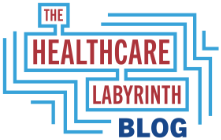Is American healthcare headed for a huge transformation? PwC things so.
NOTE: This blog is published in collaboration with Lilac Software. Learn more at https://lilacsoftware.com .
Financial and management consultant PwC came out with a blockbuster report that predicts major changes in how healthcare will be delivered over the next decade. While I believe healthcare reform is critical to save our system, it is fair to say that the technological changes too will critically remake how care is delivered.
The report is titled: “From breaking point to breakthrough: the $1 trillion opportunity to reinvent healthcare.” PwC says healthcare is in the process of a monumental shift. Artificial-intelligence-driven, consumer-centric healthcare services will emerge. This will simplify care models, lower costs, and increase quality. PwC’s main prediction is that $1 trillion of national healthcare spending could go to digital-first, personalized medical care by 2035.
The Centers for Medicare and Medicaid Services’ Office of the Actuary says national healthcare expenditures will hit about $8.6 trillion in 2033. If we apply a conservative 5% annual increase, that means healthcare will be about $9.5 trillion in 2035. So, this digital-first, individualized care will be about 10% of all healthcare spending. The huge surge in costs we have seen and are predicted in the next decade will help drive the change and perhaps begin to shave some costs off.
PwC says that current healthcare spending is rising at unsustainable rates. Executives throughout the healthcare system will need to rethink long-held assumptions on care delivery. PwC sees the transformation hitting both providers and payers. On payers specifically, PwC notes that medical cost trends are nearing double digits and that payers will be expected to deliver far more with far less.
Why is spending surging?
PwC points to a few culprits for the huge spending increases:
- Huge medical cost utilization and trends running in excess of 8% the past several years
- 90% of costs are for chronic disease states and mental health
- Siloed care delivery
- Administrative burdens for providers – a quarter of all spend is on administrative costs
- Aging
Dysfunction is created
The dysfunction has created the following fallout:
- Provider burnout
- Frustrated consumers
- Lack of affordability puts care out of reach for many
- Worsening outcomes
- Healthcare economics that continue to not work
PwC says the $1 trillion in tech-driven spend will transform fragmented healthcare models that rely on “brick-and-mortar facilities” to empowerment of “super consumers” leveraging digital, virtual, and personalized medical care. PwC says this is no pipe dream as the process has already taken hold. As it says: “Technology will no longer augment the system—it will become the system.” PwC points to the advent of virtual care during the COVID pandemic, the rise of AI, interoperability, and digital engagement that have or are taking hold.
Where is the healthcare world going?
What does PwC say 2035 will look like:
- Tech enabled parents and caregivers
- Data-rich care at home with analysis that anticipates events and disease states
- Precision virtual infrastructure
- Physicians focus on data to triage risk and care interventions – moving from managing disease to anticipating it
- Hospitals and other sites become short-term precise interventions tied closely to virtual-first primary systems
- Proactive and predictive personalized care and precision medicine with insights into everyone’s unique physiology
- AI-driven drug discovery that will reduce timeframes and costs
The future
In short, PwC says the disruptive future is virtual by design, in an integrated ecosystem, consumer first, and data intelligent.
The firm says AI and other technologies can help build capabilities to deliver medical value and actively manage population risk within a health plan and with provider partners.
The transformational leap will not necessarily be easy. Executives will need to shift resources from “fragmented infrastructure-heavy models” to next-generation service models. Old-line reliance on centralized administrative spend and labor will give way to AI-driven technology and consolidated technology platforms. Legacy siloed data infrastructure will be replaced by a new, interconnected ecosystem.
PwC sees AI and other technologies helping payers but believes far more needs to be done to stay on the cutting edge. It says: “traditional players must commit to structural reinvention, leaving behind legacy systems in favor of intelligent platforms, hybrid workforces, and outcome-based strategies.” Payers will need capabilities to deliver medical value and actively manage population risk. This could include directly intervening via ownership or indirectly across networks and supply chains that drive cost and affordability. It says payers will increasingly serve as data clearinghouses to aid the entire ecosystem in transforming care. Automation also will be key to cost reduction and future tech investment.
How does Lilac Software fit in?
Lilac is part and parcel of the transformation imagined by PwC.
- Lilac’s modern cloud-hosted unified data platform can help retire legacy platforms and bring in data from throughout the emerging ecosystem, modeling it for the future of healthcare.
- Our data intelligence layer ensures the freshest data is analyzed and presented in actionable ways for health plan actors.
- Risks, costs, and gaps can be closed using a variety of digital and legacy engagement with members and providers.
- Lilac’s focus on driving quality, reducing cost and risk, and increasing member satisfaction aligns well with migrating to personalized and individual care.
- Our agentic AI solutions reduce administrative spend and increase the scope and outreach of plans by analyzing data, assisting with mundane but important tasks, managing processes, and analyzing again and process improving.
Learn more at https://lilacsoftware.com .
PwC report: https://www.pwc.com/us/en/industries/health-industries/library/future-of-health.html
#ai #digitalhealth #healthplans #providers #technology #quality #healthcarereform
— Marc S. Ryan





